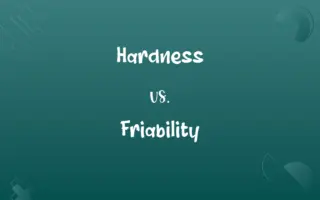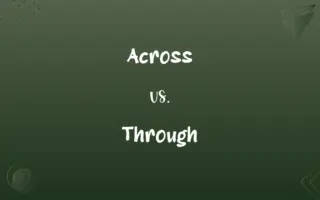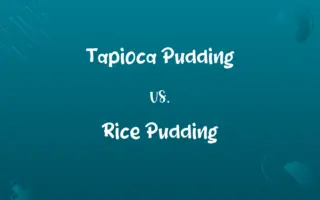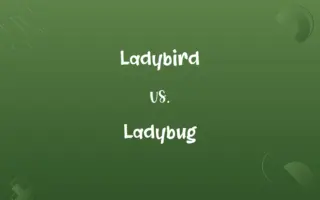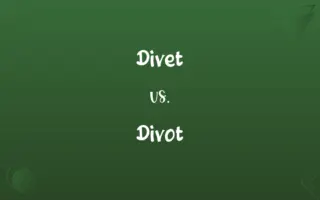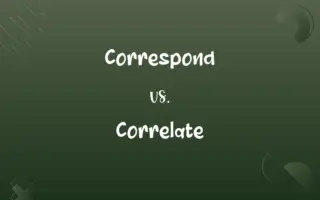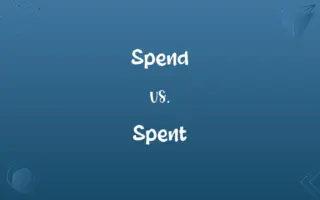Daoism vs. Taoism: Know the Difference

By Shumaila Saeed || Published on January 12, 2024
Daoism and Taoism are two spellings of the same Chinese philosophy and religion, with "Daoism" reflecting a modern transliteration and "Taoism" an older one.

Key Differences
Daoism, using the Pinyin system of Romanization, represents a more accurate phonetic rendering of the Chinese word. Taoism, on the other hand, follows the older Wade-Giles system, which was prevalent before the adoption of Pinyin. Both terms refer to the same philosophical and religious tradition originating in ancient China.
Shumaila Saeed
Jan 12, 2024
Daoism emphasizes living in harmony with the Dao (the Way), which is the source, pattern, and substance of everything. Taoism also teaches this principle but is associated with older Western interpretations of the teachings, including mystical and alchemical aspects.
Shumaila Saeed
Jan 12, 2024
In academic and scholarly contexts, Daoism is increasingly used to maintain consistency with the Pinyin system. In contrast, Taoism remains popular in general usage, especially in Western literature, preserving the historical connection with earlier works.
Shumaila Saeed
Jan 12, 2024
The philosophical aspects of Daoism focus on simplicity, spontaneity, and selflessness. Similarly, Taoism encapsulates these ideals but is often linked with traditional practices like Feng Shui, meditation, and Tai Chi.
Shumaila Saeed
Jan 12, 2024
Daoism is recognized for its influence on East Asian art, poetry, and culture. Taoism shares this influence, having shaped various cultural and religious practices across China and beyond.
Shumaila Saeed
Jan 12, 2024
ADVERTISEMENT
Comparison Chart
Spelling
Based on Pinyin transliteration.
Based on Wade-Giles transliteration.
Shumaila Saeed
Jan 12, 2024
Pronunciation
Closer to original Chinese.
Reflects older Western interpretation.
Shumaila Saeed
Jan 12, 2024
Cultural Reference
Emphasized in modern contexts.
Linked to historical and mystical aspects.
Shumaila Saeed
Jan 12, 2024
Recognition
Gaining prominence globally.
Traditionally recognized in the West.
Shumaila Saeed
Jan 12, 2024
ADVERTISEMENT
Daoism and Taoism Definitions
Daoism
A religious tradition focused on rituals and practices to align with the natural world.
Daoism teaches that simplicity and humility lead to spiritual enlightenment.
Shumaila Saeed
Dec 27, 2023
Taoism
A religious practice that involves ritual and asceticism.
In Taoism, rituals play an important role in connecting with the divine.
Shumaila Saeed
Dec 27, 2023
Daoism
An ancient philosophical system advocating a simple, honest life and non-interference with the course of natural events.
Daoism encourages adhering to the Way by embracing spontaneity.
Shumaila Saeed
Dec 27, 2023
Taoism
A belief system that focuses on the interconnectedness of all things.
Taoism teaches that everything in the universe is deeply interconnected.
Shumaila Saeed
Dec 27, 2023
Daoism
A Chinese philosophy that emphasizes living in harmony with the Dao.
In Daoism, the flow of nature is the guiding principle of life.
Shumaila Saeed
Dec 27, 2023
ADVERTISEMENT
Taoism
A way of living that emphasizes finding balance in life.
Taoism promotes finding balance between yin and yang.
Shumaila Saeed
Dec 27, 2023
Daoism
A path of understanding the fundamental nature of the universe.
Through Daoism, one learns the importance of being one with the cosmos.
Shumaila Saeed
Dec 27, 2023
Taoism
An ancient Chinese philosophy based on the writings of Lao-tzu, advocating humility and religious piety.
Taoism has greatly influenced Eastern thought with its unique perspective on harmony.
Shumaila Saeed
Dec 27, 2023
Daoism
A tradition that combines metaphysics, philosophy, and alchemy.
Daoism often involves meditation as a means to achieve higher wisdom.
Shumaila Saeed
Dec 27, 2023
Taoism
A cultural and philosophical doctrine emphasizing living in harmony with the Tao.
Taoism's core teaching is about following the natural flow of life.
Shumaila Saeed
Dec 27, 2023
Taoism
A principal philosophy and system of religion of China that is based on writings attributed to Lao Tzu, Chuang Tzu, and others, and advocates conforming one's behavior and thought to the Tao.
Shumaila Saeed
Dec 27, 2023
Daoism
Philosophical system developed by of Lao-tzu and Chuang-tzu advocating a simple honest life and noninterference with the course of natural events
Shumaila Saeed
Dec 27, 2023
Taoism
A Chinese sect claiming to follow the teaching of Lao-tzu but incorporating pantheism and sorcery in addition to Taoism
Shumaila Saeed
Dec 27, 2023
Taoism
Popular Chinese philosophical system based in teachings of Lao-tzu but characterized by a pantheism of many gods and the practices of alchemy and divination and magic
Shumaila Saeed
Dec 27, 2023
Taoism
Philosophical system developed by of Lao-tzu and Chuang-tzu advocating a simple honest life and noninterference with the course of natural events
Shumaila Saeed
Dec 27, 2023
Repeatedly Asked Queries
What are the key teachings of Daoism?
Daoism teaches about simplicity, spontaneity, and living in harmony with nature.
Shumaila Saeed
Jan 12, 2024
How does Daoism influence Chinese culture?
Daoism influences art, literature, and cultural practices in China.
Shumaila Saeed
Jan 12, 2024
How is Taoism different in spelling from Daoism?
Taoism uses the older Wade-Giles transliteration, while Daoism uses the modern Pinyin system.
Shumaila Saeed
Jan 12, 2024
Can Taoism be practiced by people outside China?
Yes, Taoism's universal principles can be adopted by people worldwide.
Shumaila Saeed
Jan 12, 2024
Is Taoism a religion or a philosophy?
Taoism encompasses both religious and philosophical elements.
Shumaila Saeed
Jan 12, 2024
What is Daoism?
Daoism is a Chinese philosophy and religion focusing on living in harmony with the Dao.
Shumaila Saeed
Jan 12, 2024
What is the role of meditation in Daoism?
Meditation in Daoism is used for self-cultivation and understanding the Dao.
Shumaila Saeed
Jan 12, 2024
How does Taoism influence health practices?
Taoism influences practices like Qigong and Tai Chi for holistic health.
Shumaila Saeed
Jan 12, 2024
What is the Dao in Daoism?
The Dao is the ultimate principle representing the fundamental nature of the universe.
Shumaila Saeed
Jan 12, 2024
Does Daoism believe in a deity?
Daoism is more about following the Way (Dao) than worshiping deities.
Shumaila Saeed
Jan 12, 2024
How does Taoism view the concept of the afterlife?
Taoism has varied views on the afterlife, often focusing on spiritual immortality.
Shumaila Saeed
Jan 12, 2024
Can Daoism be considered a form of science?
Daoism intertwines with science in understanding nature, but it is primarily a philosophy and religion.
Shumaila Saeed
Jan 12, 2024
How is Daoism practiced in daily life?
Daoism is practiced through simplicity, harmony with nature, and inner peace.
Shumaila Saeed
Jan 12, 2024
How do Daoism and Confucianism interact?
Daoism and Confucianism often complement each other in Chinese philosophy.
Shumaila Saeed
Jan 12, 2024
What is the historical origin of Daoism?
Daoism originated in ancient China, with roots tracing back to the 4th century BCE.
Shumaila Saeed
Jan 12, 2024
How is Taoism adapted in modern times?
Modern Taoism adapts ancient teachings to contemporary life, focusing on ecological balance and personal harmony.
Shumaila Saeed
Jan 12, 2024
Does Taoism have a scripture or holy book?
The Tao Te Ching and Zhuangzi are key texts in Taoism.
Shumaila Saeed
Jan 12, 2024
Is there a community aspect to Taoism?
Taoism includes community rituals and temple practices.
Shumaila Saeed
Jan 12, 2024
Are there any dietary restrictions in Taoism?
Some Taoist sects advocate for vegetarianism, but it varies.
Shumaila Saeed
Jan 12, 2024
What ethical principles does Taoism promote?
Taoism promotes virtues like humility, simplicity, and compassion.
Shumaila Saeed
Jan 12, 2024
Share this page
Link for your blog / website
HTML
Link to share via messenger
About Author
Written by
Shumaila SaeedShumaila Saeed, an expert content creator with 6 years of experience, specializes in distilling complex topics into easily digestible comparisons, shining a light on the nuances that both inform and educate readers with clarity and accuracy.
